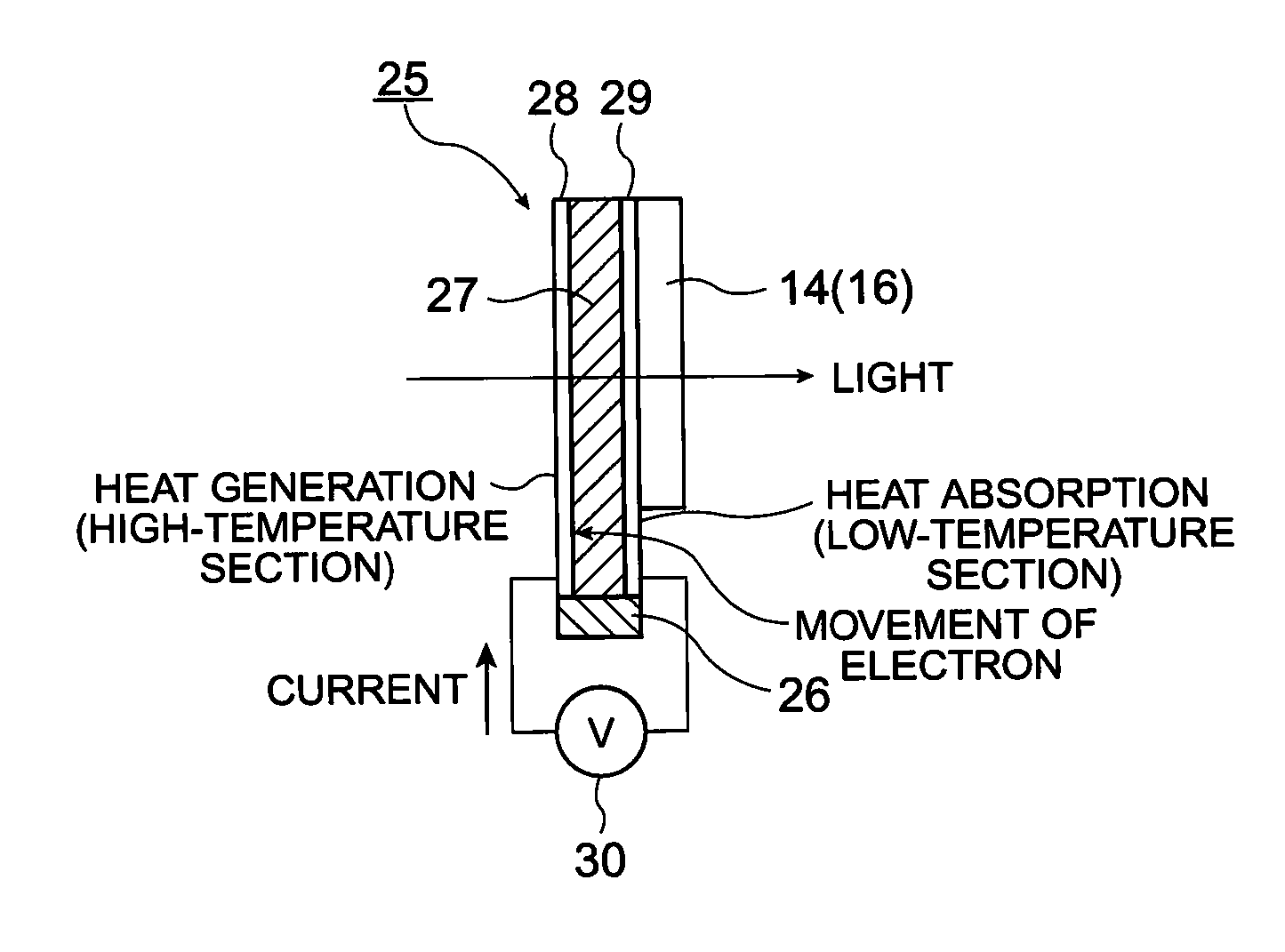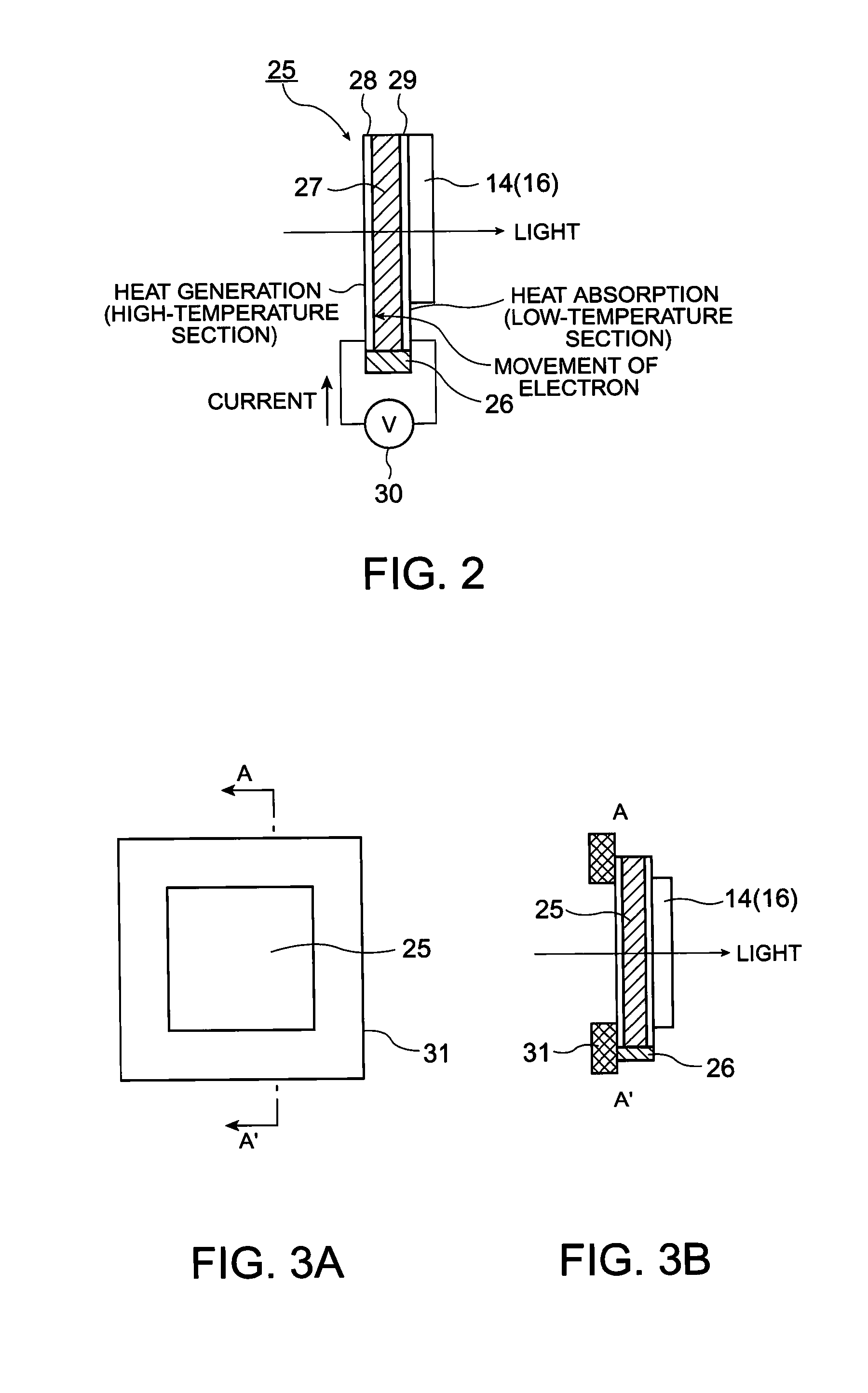Projector and display device
a projector and display device technology, applied in the direction of thermoelectric device junction materials, color television details, instruments, etc., can solve the problems of short operation life of the optical element caused by heat charge of the optical element, the inability to reduce the noise in accordance with the increase in cooling capability, and the inability to prevent heat charge. , to achieve the effect of increasing the operation life, improving the optical characteristic, and improving the operation li
- Summary
- Abstract
- Description
- Claims
- Application Information
AI Technical Summary
Benefits of technology
Problems solved by technology
Method used
Image
Examples
first embodiment
[0043]Hereinafter, a first embodiment of the invention will be explained with reference to FIGS. 1, 2, 3A, and 3B.
[0044]The present embodiment is an example of a so-called three-panel liquid crystal projector provided with a liquid crystal light valve for each of the colored light beams, a red light beam (R), a green light beam (G), and a blue light beam (B).
[0045]FIG. 1 is a schematic configuration diagram of the projector according to the present embodiment. FIGS. 2, 3A, and 3B are diagrams showing a usage configuration of a transparent thermoelectric conversion substrate used in the projector. It should be noted that in each of the drawings described below, the ratio, the scale size, and so on of each of the constituents are made different from each other in order for making the drawings eye-friendly.
[0046]In the projector 1 of the present embodiment, as shown in FIG. 1, a light source 2 is a high-intensity lamp such as a high-pressure mercury lamp, a xenon lamp, or a metal halid...
second embodiment
[0066]Hereinafter, a second embodiment of the invention will be explained with reference to FIG. 4.
[0067]The fundamental configuration of the projector of the present embodiment is the same as that of the first embodiment, and the only difference is the usage configuration of the transparent thermoelectric conversion substrate. The present embodiment also shows an example of the structure for cooling the polarization plate.
[0068]FIG. 4 is a diagram showing a usage configuration of a transparent thermoelectric conversion substrate in the projector of the present embodiment.
[0069]In the present embodiment, as shown in FIG. 4, the configuration of holding the polarization plate 14, 16 (or the polarization body) between a pair of transparent thermoelectric conversion substrates 25a, 25b is described. In other words, the both sides (both of the light entrance surface side and the light exit surface side) of the polarization plate 14, 16 (or the polarization body) are provided with the tr...
third embodiment
[0071]Hereinafter, a third embodiment of the invention will be explained with reference to FIG. 5.
[0072]The fundamental configuration of the projector of the present embodiment is the same as that of the first embodiment, and the only difference is the usage configuration of the transparent thermoelectric conversion substrate. The present embodiment also shows an example of the structure for cooling the polarization plate.
[0073]FIG. 5 is a diagram showing a usage configuration of a transparent thermoelectric conversion substrate in the projector of the present embodiment.
[0074]In the present embodiment, as shown in FIG. 5, there is described the configuration of the case in which the polarization plates 14, 16 respectively provided with the transparent thermoelectric conversion substrates 25a, 25b are used while being disposed in front of and behind the liquid crystal light valve 15. In this case, each of the polarization plates 14, 16 is preferably disposed with a slight gap (e.g.,...
PUM
 Login to View More
Login to View More Abstract
Description
Claims
Application Information
 Login to View More
Login to View More - R&D
- Intellectual Property
- Life Sciences
- Materials
- Tech Scout
- Unparalleled Data Quality
- Higher Quality Content
- 60% Fewer Hallucinations
Browse by: Latest US Patents, China's latest patents, Technical Efficacy Thesaurus, Application Domain, Technology Topic, Popular Technical Reports.
© 2025 PatSnap. All rights reserved.Legal|Privacy policy|Modern Slavery Act Transparency Statement|Sitemap|About US| Contact US: help@patsnap.com



